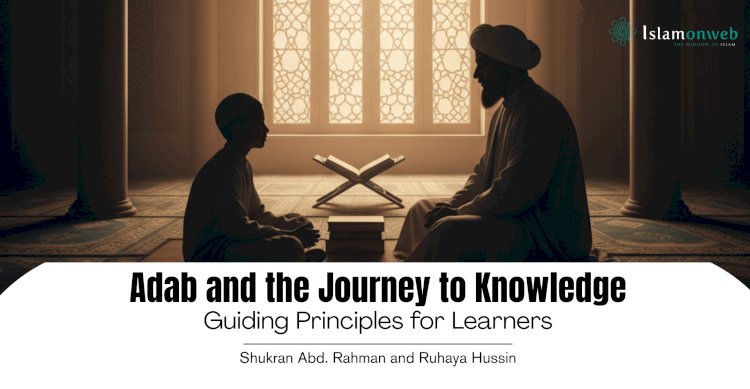Adab and the Journey to Knowledge: Guiding Principles for Learners
The pursuit of knowledge is a noble and transformative journey that extends beyond the mere acquisition of facts and skills. Integral to this journey is Adab, generally linked the concept of etiquette, manners, and ethical conduct that shapes the character, intentions, and interactions of individuals. In the context of knowledge acquisition, Adab nurtures essential qualities such as humility, patience, respect, and sincerity. These virtues are vital for enriching the learner’s experience as well as for grounding knowledge within a framework of moral responsibility and social harmony.
In recent years, many educators have expressed concern about the declining sense of adab or manners and respect among the younger generation of students. This issue has become increasingly evident in higher education, where some students demonstrate a worrying lack of courtesy and humility in their interactions with academic staff. Reports of students speaking disrespectfully to teachers and administrative officers or writing insensitive remarks about their teachers’ teaching style have raised important questions about the values guiding today’s learners.
One recurring observation among teachers, especially at higher level of education, is the rise of what can be called a “sense of entitlement.” Many students today seem to believe that gaining admission to a college or university automatically entitles them to privileges and convenience, rather than responsibility and effort. Some students complain about the workload in their courses, the level of detail covered in lectures, or the time required to complete course projects, without fully appreciating the importance of dedicating sufficient effort to achieve the desired learning outcomes. This negative perception of their academic load often leads to increased stress, preventing them from experiencing the joy of learning.
Today, the strong focus on grades and exam results can sometimes overshadow the intrinsic joy and deeper purpose of learning. This phenomenon reflects a deeper social and moral concern. Education is not merely about acquiring information or passing examinations, but it is a moral journey that shapes one’s character and integrity. True education extends beyond scores as it invites learners to engage with knowledge through genuine appreciation, respect, and curiosity. Approaching studies with these qualities would nurture the students’ academic growth as well as personal and moral development. When learners cultivate a sincere passion for understanding and a respectful attitude towards knowledge and teachers, they are more likely to experience meaningful and lasting learning that benefits both themselves and their communities.
In Islamic and Malay cultural traditions, the saying “Adab dahulu, kemudian ilmu” (“Manners first, then knowledge”) carries profound meaning. It emphasizes that before a person can truly gain knowledge, they must first cultivate good manners, humility, and respect for teachers and peers. Classical scholars such as Imam al-Ghazali warned that knowledge without adab is dangerous as it can lead to arrogance, misuse of learning, and the corruption of moral values. Adab forms the ethical foundation that ensures knowledge is used for good and contributes positively to society. It teaches respect for teachers, appreciation for effort, and humility in the pursuit of truth. When adab is neglected, the process of learning itself becomes shallow and transactional. Students may study merely to obtain grades or qualifications, rather than to understand and internalize knowledge. This does not only diminish the values of education but also erodes the respectful relationship between teacher and student that has long been the cornerstone of meaningful learning.
Another prominent thinker, Syed Muhammad Naquib al-Attas, a contemporary Islamic scholar, argues that the crisis in modern education stems from a loss of adab. Al-Attas identifies the erosion of adab, meaning the loss of proper discipline and respect, as the root crisis in education. When adab is absent, he notes, confusion and injustice prevail, knowledge is misused, teachers are not respected, and students fail to develop sound character. Al-Attas advocates a return to an educational philosophy he terms ta'dib (the imparting of adab), in which intellectual, moral, and spiritual development are integrated. In this model, education is not merely the transfer of information but the inculcation of wisdom and virtue. The principle of ta'dib integrates intellectual, moral, and spiritual development, essentially binding knowledge with adab. This holistic approach produces individuals who are not only intelligent but also righteous and courteous.
Islamic teachings therefore emphasise that adab is the foundation of education. A well-known saying in the tradition states that a person without manners (adab) is like a body without a soul. The legacy of scholars such as al-Ghazali and al-Attas reinforces that education must cultivate character and values, not just academic achievement. By reviving adab, we ensure that knowledge is applied with wisdom and humility. How can we practically incorporate these lessons into today's classrooms? The following strategies provide actionable steps for educators, parents, and institutions to restore adab at both individual and institutional levels.
Strategies for Inculcating Adab at the Individual Level
Besides parents, educators have the most direct influence on students' character. Educators serve as mentors and role models, with their everyday behaviours setting an example for others to follow. An educator who engages students in respectful discussion exemplifies humility in the teacher-student relationship. Actively focusing on educating students and listening to their needs or questions embodies adab in practice. By modelling and reinforcing respectful behaviour daily, educators lay the groundwork for a culture of adab. Individuals at every level, whether educators, students, or parents, can take concrete steps to nurture respect and humility in the learning process, including the strategies outlined below:
Model respectful behaviour
Children learn adab by observing it. Teachers for example, should consistently treat students with kindness and fairness by saying "please" and "thank you," listening without interrupting, and addressing mistakes calmly. Likewise, parents can model courteous speech and empathy at home. When adults embody humility and respect, students are more likely to mirror those attitudes.
Encourage intellectual humility
Create a classroom norm that it is acceptable not to know everything. Educators can admit when they do not have the answer to a question and demonstrate how to find it, showing that learning is a lifelong journey. Encourage students to say "I might be wrong" or ask for help when needed. By normalising phrases like "I do not know (yet)," educators reinforce that questioning and learning from errors are part of growth, a key aspect of adab.
Use stories and role models
Incorporate stories from history, literature, or religious tradition that highlight humility, respect, and good character. For example, educators might share anecdotes of scholars who remained humble despite great knowledge, or stories of cooperative teamwork. Islamic history is rich with examples, such as the Prophet Muhammad's patience with others, or Imam al-Ghazali's own journey of learning with humility, which can inspire students of all backgrounds. Discuss these stories and ask students what lessons they offer for how we treat others.
Recognise and reward courtesy
Positive reinforcement can be very effective. When a student displays good manners, empathy towards a classmate, or honesty about a mistake, acknowledge it. This could be through simple praise such as "I appreciate how respectfully you disagreed just now" or more formal recognition, such as a monthly "Adab Award" for helpful behaviour. Highlighting these moments shows that the school values character and motivates students to continue practising adab.
Encourage self-reflection
Help students develop self-awareness about their own behaviour. Educators can use quick reflective exercises for instance, asking students to write a short journal entry about how they handled a group activity, or to rate how respectfully they listened to others in a discussion. Parents, too, can gently ask children to consider how their actions affect others, for example, "How do you think your classmate felt when you interrupted?". Such reflection builds the habit of accountability and empathy intrinsic to adab.
By implementing these individual-level practices, classrooms become more than just information hubs. They become communities that cultivate character. Students begin to internalise respect and humility not as imposed rules, but as personal values that feel rewarding and right. Of course, individual efforts thrive best within a supportive wider environment. This is where schools and communities play a critical role in institutionalising adab.
Strategies for Inculcating Adab at the Institutional Level
Educational institutions can deliberately design policies and cultivate a culture that reinforces adab on a broad scale. When educational institutions prioritise character development alongside academic achievement, they send a powerful message that respect, and humility are essential components of education. The following are strategies that can be implemented at the educational institutions or community level:
Provide values-based educator training
Educators should be equipped not only with subject knowledge and pedagogy, but also with the skills to foster a respectful classroom environment. Professional development workshops can train educators in compassionate communication, conflict resolution, and cultural humility. In Islamic pedagogy, the educator's character is paramount, echoing al-Ghazali's view that an educator is as much a role model as a source of knowledge. Ongoing training ensures that every classroom is led by someone committed to adab.
Establish an Educational Institution-wide culture of respect
This can be achieved by creating clear codes of conduct that highlight respect, kindness, and integrity as core expectations for all students and staff. Educational institutions might begin the day with a moment of reflection or a quotation about good character. Assemblies and campaigns can celebrate values such as humility and service. Importantly, disciplinary policies should aim to correct behaviour constructively for example, using restorative justice approaches that encourage students to reflect on and make amends for disrespectful behaviour, rather than simply punishing them. A consistent, institutional-wide emphasis on adab ensures that the message extends beyond individual classrooms and lectures.
Engage parents and community leaders
Character education is most effective when reinforced beyond the educational institutions environment. Educational institutions can hold parent workshops or send newsletters about encouraging adab at home, such as setting expectations for polite language or limiting screen time during family interactions to promote attentive listening. Involving community and religious leaders can further reinforce the message; for example, an imam or community elder might be invited to speak to students about the importance of humility and respect in life. When students see respected adults in their community upholding adab, it strengthens their resolve to do the same.
By institutionalising these practices, educational institutions create an environment where adab flourishes. The institutional level reinforces and amplifies the efforts of individual institution and students. A student who hears the same message of respect at home, in class, during assemblies, and even on the sports field or in extracurricular clubs, is far more likely to deeply internalise that values. Over time, an adab-centred educational environment produces graduates who carry their respect and humility into higher education, the workplace, and society at large.
Cultivating adab in education is about reclaiming the soul of learning. It means recognising that teaching and learning are not merely exchanges of information, but transformative processes that shape character. When we prioritise respect, humility, and good conduct, we honour the full dignity of the educational experience. Reclaiming adab is not a nostalgic longing for outdated manners; it is a forward-looking strategy to humanise education and prepare students for life. A generation of young people educated with adab will be respectful in discourse, humble in seeking truth, and compassionate as citizens, precisely the kind of individuals our world needs. The responsibility lies with all of us, educators in their classrooms, parents at home, leaders in their policies, and students in their daily choices, to restore this balance of knowledge and character. By doing so, we can transform our educational institutions into communities of learning where respect is as fundamental as reading, and humility as valued as high marks. Inculcating adab in education ultimately means nurturing not only better students, but better human beings, and that is a goal worthy of our deepest commitment.
About the authors :
Shukran Abd Rahman is a Professor of Industrial and Organisational Psychology at the Department of Psychology, AbdulHamid AbuSulayman Kulliyyah of Islamic Revealed Knowledge and Human Sciences, International Islamic University Malaysia.
Ruhaya Hussin is an Associate Professor of Industrial and Organisational Psychology and Head, Department of Psychology, AbdulHamid AbuSulayman Kulliyyah of Islamic Revealed Knowledge and Human Sciences, International Islamic
Disclaimer
The views expressed in this article are the author’s own and do not necessarily mirror Islamonweb’s editorial stance.
























Leave A Comment